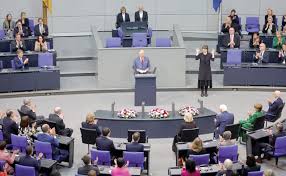On his three-day trip to Germany, King Charles III captivated the hearts of many people. This was his first overseas tour since taking the throne after the passing of his mother, Elizabeth II, last year.
At a time when Berlin and London are working to mend ties damaged by Britain’s exit from the European Union, Charles’ journey featured a number of firsts that demonstrate the emphasis both nations placed on it.
The queen consort and Prince Charles were welcomed with military honors at the Brandenburg Gate by German President Frank-Walter Steinmeier on Wednesday. The following day, Charles made history by becoming the first king to address the Bundestag, the German parliament, and emphasize the value of continued collaboration between the two nations.
Both German and British observers agreed that the trip was a clear indication of the long-lasting strength of Britain-German relations.
Charles conveyed a “clear message” by speaking in part in German to the German parliament, according to Jens Zimmermann, a lawmaker for the center-left Social Democrats in Germany.
According to Zimmermann, “The address in the Bundestag was really well-received.” Unlike what you might have anticipated, it was a lot more political. It was quite resonant, and I thought that was excellent.
In his address, Charles stressed how London and Berlin have helped Ukraine significantly in its efforts to stave off Russia’s invasion. This commendation will have pleased the German government, which is more accustomed to hearing that Kyiv needs more assistance. Zimmermann suggested that Charles’ praise of the Germans for sheltering so many Ukrainian refugees from the conflict could be interpreted as a subtly critical rebuke of the British government’s recent anti-refugee measures.
King Charles cannot directly change British policy or pass legislation, but Zimmermann warned against underestimating the “soft power” of his visit.
Others agreed, saying that following the pandemic’s long-distance diplomacy, in-person meetings like Charles’ can contribute to strengthening and refreshing relations between leaders.
The value of face-to-face meetings has been brought to our attention as the coronavirus has subsided, according to Bronwen Maddox, CEO of the Chatham House research tank.
In particular, she added, “it just does add something to interactions between heads of state, which are quite sheltered.” “I believe that it has been favorably received,”
Charles had intended to travel to France first, but both countries decided to postpone that portion of his journey due to anti-government demonstrations there. The new itinerary gave Germany more attention because Charles has family ties there and the royals have long piqued people’s interest.
At Charles’ visits, the German public’s fascination was on display. Well-wishers patiently waited to welcome Charles and Camilla at their visits to Berlin and Hamburg, a city that views itself as having a particularly deep link to Britain due to its ancient maritime and commercial ties. This was true despite the damp and chilly spring weather.
In remembrance of the more than 30,000 people—mostly German civilians—who perished in Operation Gomorrah, the Allied bombing of Hamburg in July 1943, Charles and Camilla also placed a wreath at the site of St. Nikolai church. The king’s visit was concluded on Friday with a boat ride and a farewell reception that featured musical performances, including those by a Beatles cover band and a sea shanty group.
Like Zimmermann, Michael Kruse is a member of the German-British parliamentary group and claims that despite Britain’s exit from the EU, the two countries still share a number of economic interests.
Brexit has caused the channel to expand, he claimed. “For this reason, the visit by the head of state of Britain was even more significant.”
Kruse expressed the wish of many Germans that London will once again join the 27-nation bloc.
He continued, “My hope is still that the British would one day realize that leaving the EU was a mistake and come back.” “The door should be open for these at all times. King Charles III, till then, we say: “See you again.”

















